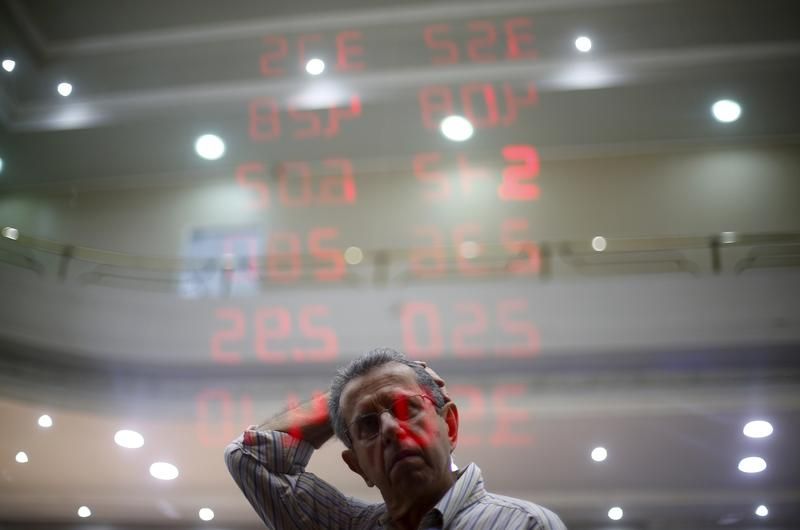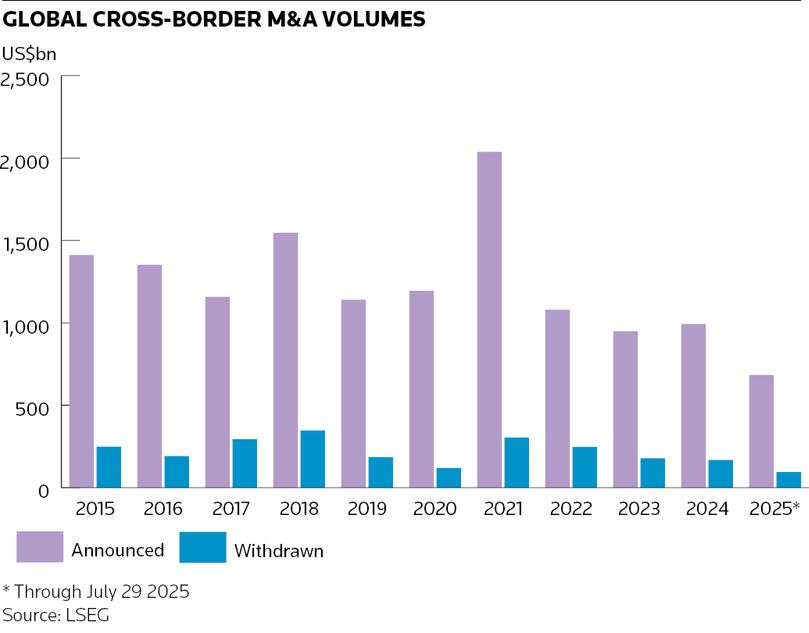Hedge funds pitch risky deal-contingent derivatives to private equity firms

Hedge funds have approached private equity firms about trading complex currency derivatives hedging risks on cross-border acquisitions directly with them, industry insiders say, a move that threatens to cut investment banks out of a business they have dominated for years.
Banks offer these “deal-contingent” derivatives to private equity and corporate clients looking to shield themselves against adverse moves in foreign exchange rates around the time of large mergers and acquisitions. The hedges only come into force if the underlying M&A deal completes, a feature that makes them fiendishly hard to handle for the banks that sell them.
More hedge funds have muscled their way into these markets in recent years by offering to take these dicey risks off banks’ hands. While some banks are critical of this practice, many have embraced the hedge fund influx, arguing it improves liquidity and pricing for their clients and helps spread risk through the system.
But the expansionary ambitions of some funds could yet strain this newfound alliance, as banks confront yet another example of outsiders encroaching on one of their mainstay activities.
“We are seeing hedge funds going directly to the largest private equity sponsors and pitching the idea of facing them directly on deal-contingent trades,” said Mark Beaumont, head of European risk management at financial consultancy PMC Treasury. “That’s a threat to the banks because it potentially cuts them out of the process.”
Complex
Demand for contingent options has grown as more dealmakers have looked to lock in the economics on their transactions. These derivatives allow companies engaging in M&A or other major transactions to protect against sharp moves in currencies or financing costs between the time a deal is announced and when it completes.
The most valuable feature for buyers – and the riskiest part for the banks selling them – is that the client can walk away without paying for the hedge if the deal falls through. That dynamic has at times proved painful for banks. For instance, Barclays suffered a US$125m hit on a deal-contingent trade in late 2021 following Advent International’s abortive takeover of drugmaker Swedish Orphan Biovitrum.
It’s hardly surprising then that many banks have welcomed the growing pool of hedge funds offering to take these notoriously thorny risks off their hands. Nonbank players include Ken Griffin’s Citadel, Izzy Englander’s Millennium Management and trading firm Jane Street, which have all increased their presence in deal contingents in recent years, according to sources familiar with the matter.
Citadel, for instance, hired Ben Levine in 2023 from Morgan Stanley to lead its deal-contingent effort and Daniel Russell from the same bank last year to focus on this strategy in its fixed income and macro business, sources said.
London-based credit specialist Sona Asset Management is another investment manager that has become more involved in deal contingents, with Brian Kelly leading that effort after joining the firm last year to focus on merger arbitrage, sources said. These firms join hedge fund giant DE Shaw, which has been involved in deal-contingent derivatives for more than a decade, sources said.
“A number of banks are happy to have a way to offload some of the risk with hedge funds. It potentially gives them better pricing, more capacity, the ability to take on larger trades and an additional risk management tool,” said Benoit Duhil de Benaze, managing director, hedging and capital markets, at consultancy Chatham Financial. “Other banks keep the trades on their books and pitch it as a differentiator.”
Spokespeople for Jane Street, Millennium and Sona declined to comment, while DE Shaw spokespeople didn't respond to requests for comment. There is no suggestion that these firms have approached private equity investors to offer deal-contingent derivatives directly.
After this article was published, a Citadel spokesperson said in a statement that the firm has not approached private equity investors to offer deal-contingent derivatives directly.
Delicate balance
Banks that distribute deal-contingent risk to hedge funds include Bank of America, Barclays, BNP Paribas, Deutsche Bank and Morgan Stanley, sources say, while Citigroup, Goldman Sachs and JP Morgan have largely refrained from the practice.
Spokespeople for the banks declined to comment.
The prospect of hedge funds pitching these trades directly to their private equity clients may alarm banks, which are already facing growing competition from shadow banks like hedge funds, trading firms and private credit funds in everything from trading securities to lending money to companies. It also shows the delicate balancing act banks must perform when looking to recycle some of their riskiest and most commercially sensitive client exposures.
Despite the push from at least some nonbanks to transact directly with dealmakers, many are doubtful that private equity firms would agree to face nonbanks directly on deal-contingent trades given the potential counterparty credit risk involved. They may also be nervous about relying on a hedge fund for a critical part of the M&A process. Deal-contingent FX trades often involve billions of dollars of currency changing hands at just the right moment.
“That money needs to reach the right place at the right time for the M&A to close and there may be nervousness from [private equity] sponsors around whether hedge funds would deliver in that context,” Beaumont said.
Some hedge funds have said privately that they have no interest in disintermediating banks from this market. One such fund is DE Shaw, according to two sources familiar with the matter, which has pitched itself to banks as a partner that will absorb their deal-contingent risks, freeing up capacity for banks to execute larger trades.
The additional operational and regulatory burden that would likely come with trading bespoke derivatives directly with a private equity firm may also act as a deterrent for hedge funds.
“It’s not straightforward for hedge funds to deal directly with private equity firms either. There are lots of operational and regulatory hoops they need to jump through,” said Duhil de Benaze.
Dividing opinion
Either way, hedge funds’ expansion in the deal-contingent market is divisive. With banks facing constraints on capital and risk, proponents have cheered their arrival, noting it has allowed banks to increase their presence in this business and sharpen their pricing.
“Our first order principle is how do we provide the best liquidity and pricing to our client,” said one senior trader at a major bank. “When it comes to these products, the focus is entirely on the management of the risk and the requirements of the end-user client, and anything that helps provide that liquidity is constructive.”
Another senior trader touted the risk management benefits. “We wanted to get the whole [deal-contingent business] on a rigorous risk footing and size our risk appropriately, even if that means paying away some of the deal-contingent fee to the hedge funds that take the risk off our hands,” he said.
One deal-contingent veteran drew a parallel to price comparison websites where different brokers display quotes for car or travel insurance policies that are usually backed by the same handful of underwriters. “Should it really matter to the client who is the back end?” they said.
But critics say it should – and reject the notion that their concerns can be dismissed as sour grapes over the shrinking profit margins in a once lucrative business. Their argument is that hedge fund involvement raises issues around potential conflicts of interest and the possibility of leaks of sensitive client information around M&A.
“There are so many conflicts embedded in those relationships where you're advising a [client], but also hedging the risk with a hedge fund,” said a third senior trader at a major bank. “I actually think it’s an accident waiting to happen.”
Proponents reject these claims and say there are safeguards in place, including legally binding contractual obligations hedge funds must consent to. “These are big firms and they care about their reputation and not getting into trouble,” the second trader said. “For hedge funds, their whole livelihood depends on this not happening.”
Certainly, this debate hasn’t stopped hedge funds from playing an increasingly central role in the development of these markets, even if the criticisms have resonated with some private equity firms on certain deals.
“Some sponsors are very sensitive around the flow of information and will actively demand banks don’t approach hedge funds,” said Beaumont. “The last thing a PE firm wants is a hedge fund working against their objectives just because a bank has involved them on a DC.”






